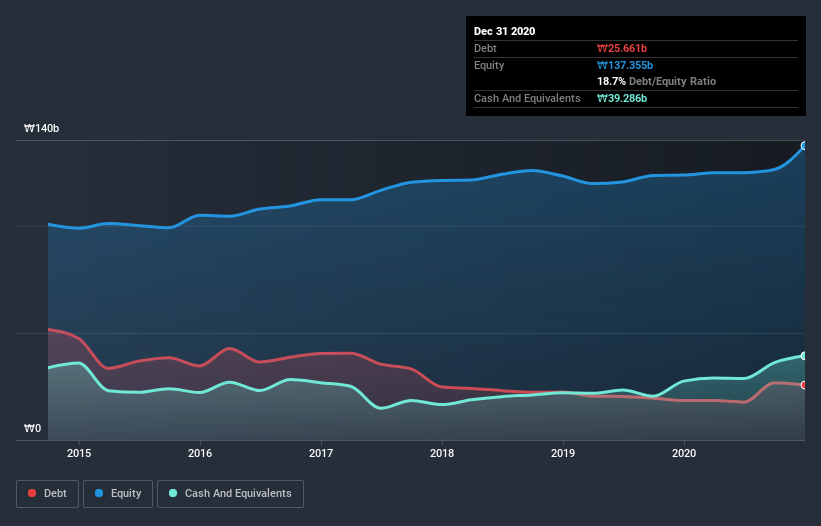The external fund manager backed by Berkshire Hathaway's Charlie Munger, Li Lu, makes no bones about it when he says 'The biggest investment risk is not the volatility of prices, but whether you will suffer a permanent loss of capital.' So it seems the smart money knows that debt - which is usually involved in bankruptcies - is a very important factor, when you assess how risky a company is. We can see that JVM Co., Ltd (KOSDAQ:054950) does use debt in its business. But is this debt a concern to shareholders?
Why Does Debt Bring Risk?
Debt is a tool to help businesses grow, but if a business is incapable of paying off its lenders, then it exists at their mercy. In the worst case scenario, a company can go bankrupt if it cannot pay its creditors. However, a more frequent (but still costly) occurrence is where a company must issue shares at bargain-basement prices, permanently diluting shareholders, just to shore up its balance sheet. Of course, plenty of companies use debt to fund growth, without any negative consequences. The first step when considering a company's debt levels is to consider its cash and debt together.
View our latest analysis for JVM
How Much Debt Does JVM Carry?
You can click the graphic below for the historical numbers, but it shows that as of December 2020 JVM had ₩25.7b of debt, an increase on ₩18.5b, over one year. However, its balance sheet shows it holds ₩39.3b in cash, so it actually has ₩13.6b net cash.

A Look At JVM's Liabilities
According to the last reported balance sheet, JVM had liabilities of ₩59.9b due within 12 months, and liabilities of ₩2.67b due beyond 12 months. Offsetting these obligations, it had cash of ₩39.3b as well as receivables valued at ₩22.8b due within 12 months. So its total liabilities are just about perfectly matched by its shorter-term, liquid assets.
Having regard to JVM's size, it seems that its liquid assets are well balanced with its total liabilities. So while it's hard to imagine that the ₩214.8b company is struggling for cash, we still think it's worth monitoring its balance sheet. Despite its noteworthy liabilities, JVM boasts net cash, so it's fair to say it does not have a heavy debt load!
On top of that, JVM grew its EBIT by 49% over the last twelve months, and that growth will make it easier to handle its debt. There's no doubt that we learn most about debt from the balance sheet. But ultimately the future profitability of the business will decide if JVM can strengthen its balance sheet over time. So if you're focused on the future you can check out this free report showing analyst profit forecasts.
Finally, while the tax-man may adore accounting profits, lenders only accept cold hard cash. While JVM has net cash on its balance sheet, it's still worth taking a look at its ability to convert earnings before interest and tax (EBIT) to free cash flow, to help us understand how quickly it is building (or eroding) that cash balance. During the last three years, JVM generated free cash flow amounting to a very robust 90% of its EBIT, more than we'd expect. That puts it in a very strong position to pay down debt.
Summing up
While it is always sensible to look at a company's total liabilities, it is very reassuring that JVM has ₩13.6b in net cash. The cherry on top was that in converted 90% of that EBIT to free cash flow, bringing in ₩11b. So we don't think JVM's use of debt is risky. When analysing debt levels, the balance sheet is the obvious place to start. However, not all investment risk resides within the balance sheet - far from it. To that end, you should be aware of the 2 warning signs we've spotted with JVM .
Of course, if you're the type of investor who prefers buying stocks without the burden of debt, then don't hesitate to discover our exclusive list of net cash growth stocks, today.
When trading JVM or any other investment, use the platform considered by many to be the Professional's Gateway to the Worlds Market, Interactive Brokers. You get the lowest-cost* trading on stocks, options, futures, forex, bonds and funds worldwide from a single integrated account. Promoted
New: Manage All Your Stock Portfolios in One Place
We've created the ultimate portfolio companion for stock investors, and it's free.
• Connect an unlimited number of Portfolios and see your total in one currency
• Be alerted to new Warning Signs or Risks via email or mobile
• Track the Fair Value of your stocks
This article by Simply Wall St is general in nature. It does not constitute a recommendation to buy or sell any stock, and does not take account of your objectives, or your financial situation. We aim to bring you long-term focused analysis driven by fundamental data. Note that our analysis may not factor in the latest price-sensitive company announcements or qualitative material. Simply Wall St has no position in any stocks mentioned.
*Interactive Brokers Rated Lowest Cost Broker by StockBrokers.com Annual Online Review 2020
Have feedback on this article? Concerned about the content? Get in touch with us directly. Alternatively, email editorial-team (at) simplywallst.com.
About KOSDAQ:A054950
JVM
Develops and sells automation systems and software of dispensing, packaging, and medication management for hospitals and pharmacies worldwide.
Undervalued with excellent balance sheet.
Market Insights
Community Narratives



